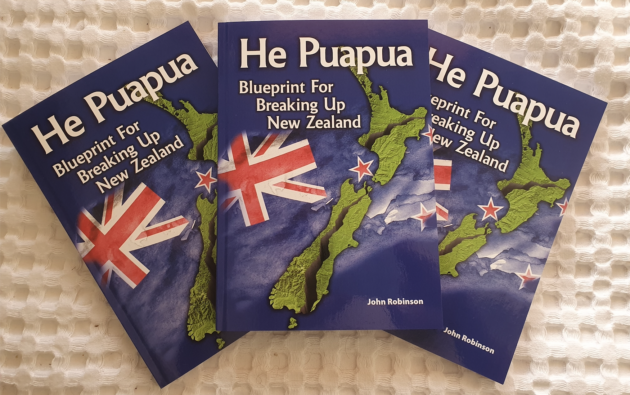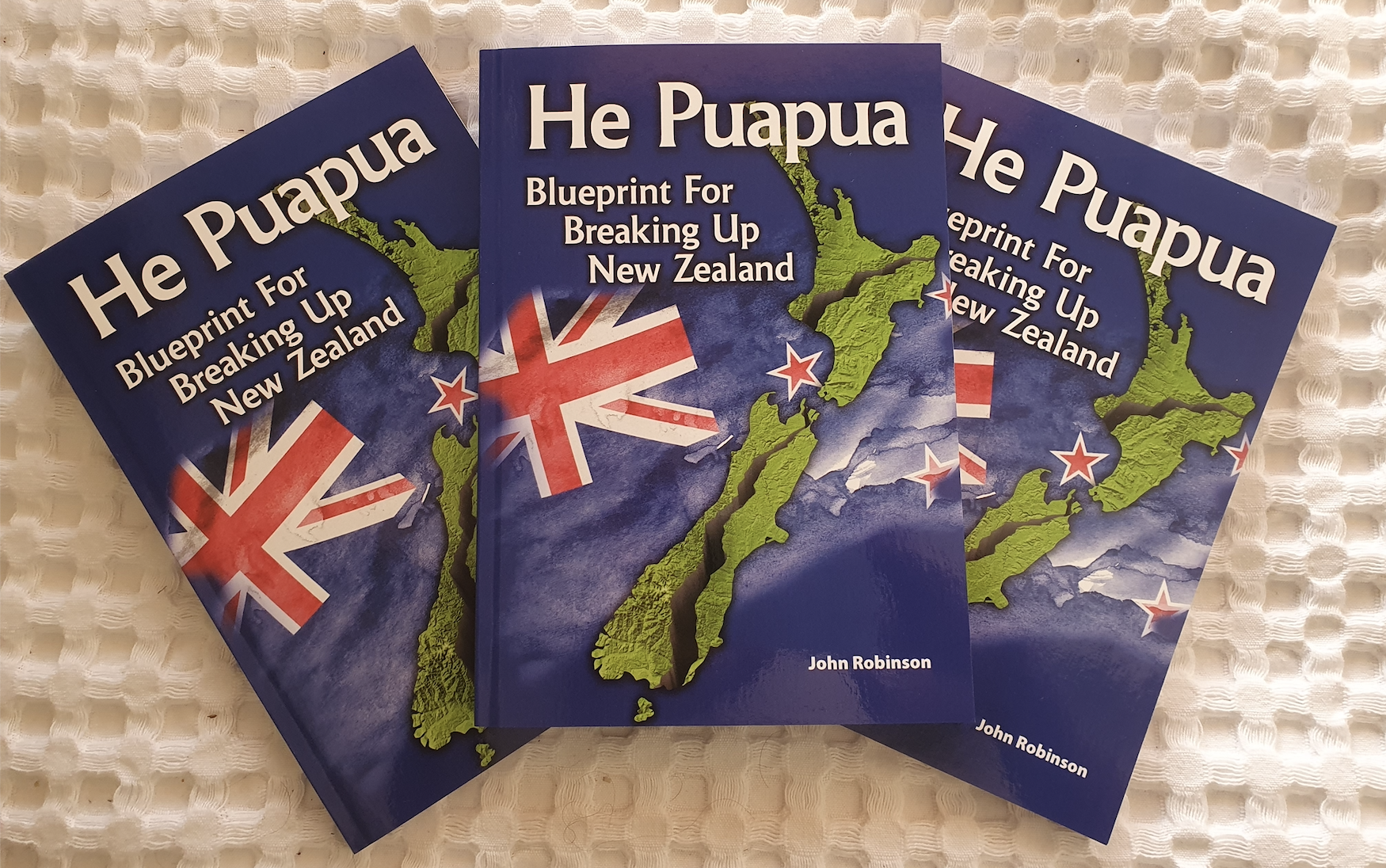
He Puapua – Blueprint For Breaking Up New Zealand – Book review:
Author: Dr John Robinson, Tross Publishing (2021).
He Puapua, a new book, encompasses an in-depth study of the many issues surrounding New Zealand moving towards self-government for Maori. The publication, based on a report of the same name, is controversial as Dr Robinson strongly states his concerns that New Zealand is to be divided along racial lines.
The cover picture shows a map of New Zealand torn apart and the subtitle gives a clue. The book (169 pages) is an excellent read for anyone interested in this report and the implications of its contents for the country. Whether for or against these radical changes, a reader or student, wanting a summary of the background and history, will find this author’s research is thorough with a large bibliography and index.
Dr Robinson, a PhD research scientist and former university lecturer relates He Puapua (the report) to NZ historical events. He gives valuable insight into the people involved and the politics designed to bring about self-government for Maori, which is contrary to the democratic principle of equality for all New Zealanders. He explains this ‘movement’ has been in the pipeline for about 50 years. In a nutshell, his views are that Maori self-government and living within a democracy do not go together.
The United Nations Declaration on the Rights of Indigenous Peoples (2007) and the United Nations representatives who have visited NZ Maori have had significant roles in forming this view. There is an analysis of how He Puapua is currently being implemented in law by the politicians.
- Special Rapporteur, Rodolfo Stavenhagen, a German sociologist and anthropologist visited NZ for 10 days in 2005, prompted by the finding of the United Nations Committee on the Elimination of Racial Discrimination. He attended hui with Maori leaders from all over the country and listened to one side, the Maori complainants. p48
- In 2010, a second UN Special Rapporteur, James Anaya visited for 6 days. Unlike the visit of Stavenhagen, this visit was welcomed by the then National government. Article Three among 34 Articles declares Indigenous people have the right of autonomy to self-determination. p53
- A third UN report 2019 set down a path for dual governance, after a visit of Laila Vars and Edtami Mansayagan who came at the invitation of the Maori Aotearoa Independent Monitoring Mechanism. p125
Most New Zealanders were not aware of this report until the Act Party last year obtained a redacted copy of the He Puapua report dated 1 November 2019, under the Official Information Act. It came as a shock that this proposal for a dual society, formed on a racial basis, was being implemented without consultation or referendum. The intention was kept hidden by the Labour Government during the 2020 General Election.
Robinson quotes Professor Elizabeth Rata for the Victoria University Democracy Project, published in scholarly journals (1996-2013),
The He Puapua Report proposes revolutionary change for New Zealand. The question of how we have arrived at a crossroads where New Zealanders will have to choose between an ethno- nationalist state – which He Puapua leads to – or a democratic- nationalist one has its origins in three events in 1985, 1986 and 1987.
It was in these years that the concept of a Treaty of Waitangi ‘partnership’ was created. It is the foundational pillar for the Report’s goal of ‘transformative restructuring of governance to recognise rangatiratanga Maori’. Now such iwi self-determination includes co-governance arrangements laid out in He Puapua. […]
-The first key partnership event is the 1985 Treaty of Waitangi Amendment Act. While the 1975 Treaty of Waitangi Act was about the settlement of historical grievances, the 1985 Amendment Act was a very different matter. The recognition of iwi- Maori rather than pan-Maori as the inheritors of Treaty settlements established the reviving tribe as both political player and economic corporation.
-The second event was the creation of Treaty principles. A year after the 1985 Amendment Act, Deputy Prime Minister Geoffrey Palmer agreed to Sir Hepi Te Heuheu’s request to insert the clause ‘Nothing in this Act shall permit the Crown to act in a manner that is inconsistent with the principles of the Treaty of Waitangi‘ into Section 9 of the State-owned Enterprises Act 1986. […] Parliament did not define the principles – an unconscionable failure which opened the way for the courts and government officials to determine what is probably one of the most important political events of the 20th century. […]
-The third event was the 1987 Court of Appeal decision stating that the treaty established a relationship ‘akin to a partnership’. Although the judges likened it to the obligation partners in a partnership had they did not say that the treaty actually created a partnership. Nor did it. However, ‘partnership’ was quickly picked up by the Waitangi Tribunal and by the 1987 Iwi Leaders’ Forum. […] p16 & 17
At the time this book was published, New Zealanders were suffering under the restrictions of the COVID-19 pandemic. On 3 December 2021, the country was divided into two classes of people by PM, Jacinda Ardern.
Along with this heartless injustice, New Zealanders found out Maori can form a Maori Parliament, a Maori Court and a Maori Social Development system. They can self-govern economic, education, and health policies and systems and have the legal framework to exercise full authority over New Zealand’s lands, water and natural resources.
Ardern is making uncontested huge constitutional changes, dividing NZ not only by whether they have had a jab, but into two distinctive groups, the Maori elite and the other nationalities who will be the subservient majority.
The report begins with a condemnation of colonisation – He tongikura na kiingi Taawhioa, which sets a premise of an anti-Pakeha view.
The book can be found in local libraries. Already it has been called anti-Maori by its critics and is not available in main bookstores.
To purchase: www.trosspublishing.co.nz

